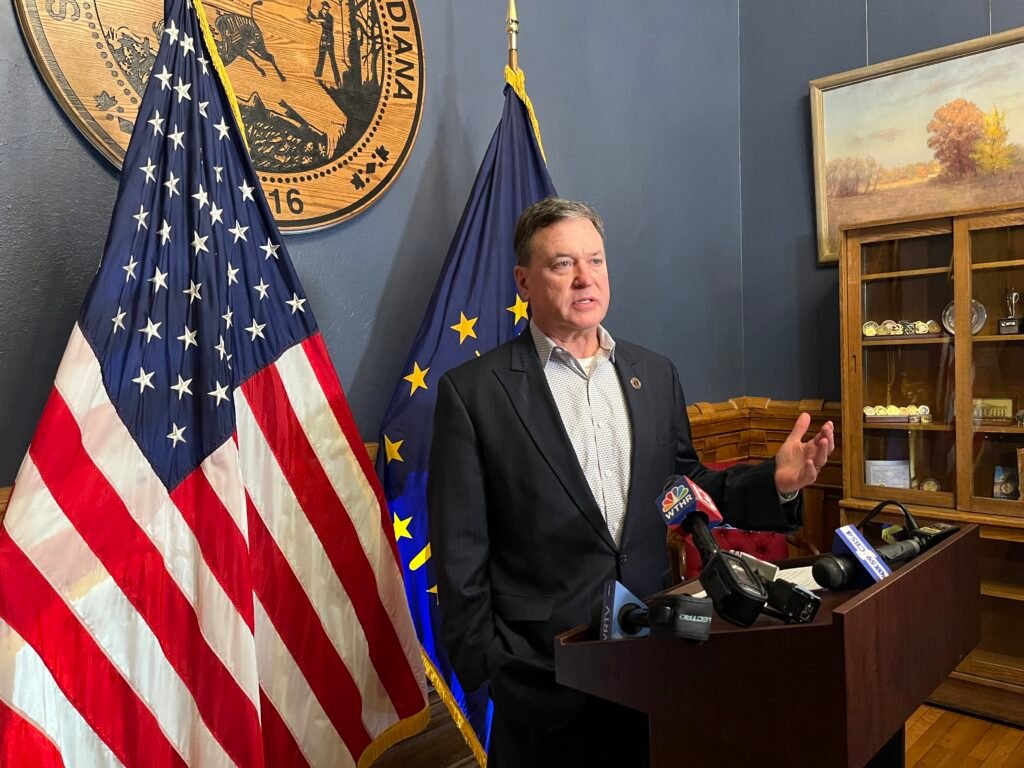
Indiana Attorney General Todd Rokita speaks to the media on Friday, March 21, 2025, at his office in Indianapolis. (Niki Kelly/Indiana Capital Chronicle)
Indiana has used more than $491,000 in public funds to defend Attorney General Todd Rokita in multiple disciplinary investigations and formal ethics cases, according to new records obtained by the Indiana Capital Chronicle.
The state paid four law firms a combined $491,508 between 2022 and 2025 to represent Rokita in at least six separate matters before the Indiana Supreme Court Disciplinary Commission — investigations that the Republican describes as politically motivated and retaliatory.
Only two of the investigations resulted in formal disciplinary charges.
The Capital Chronicle previously reported partial figures showing dollars spent on Rokita’s disciplinary defense, but new records provide a more complete accounting.
We’re paying four law firms close to half a million dollars so that Todd Rokita can keep his law license and stay in office. That’s a campaign expense — not something the public should have to fund.
– Rep. Ed DeLaney, D-Indianapolis
The highest payment — more than $240,000 — went to Indianapolis-based Ammeen and Associates, which represents Rokita in the current ethics case still pending before the disciplinary commission.
The state paid an additional $177,650 to Greenwood-based Patrick Olmstead Law; $57,995 to Washington, D.C.-based Schaerr Jaffe; and $15,560 to Indianapolis-based Lewis and Wilkins, according to information released by the attorney general’s office.
Indiana’s Transparency Portal shows the legal firms have previously been contracted by Rokita’s office and other state agencies to assist with separate litigation and legal matters.
But Democrat Rep. Ed DeLaney, a longtime lawyer from Indianapolis, maintained that taxpayers “shouldn’t be footing the bill.”
“We’re paying four law firms close to half a million dollars so that Todd Rokita can keep his law license and stay in office,” he said. “That’s a campaign expense — not something the public should have to fund.”
Indiana has in the past covered legal costs for public attorneys, judges, and prosecutors facing complaints that arise from actions taken in the course of their official duties, as long as those actions aren’t criminal or personal in nature. One section in Indiana Code specifically requires the state to indemnify prosecutors for expenses incurred in lawsuits or disciplinary proceedings related to a “decision, a duty, an obligation, a privilege, or a responsibility of the prosecuting attorney’s office.”
Years of disciplinary investigations
The ongoing complaint stems from Rokita’s nationally televised comments in June 2022 about Indianapolis OB-GYN Dr. Caitlin Bernard, who oversaw a medication abortion for a 10-year-old rape victim from Ohio that summer.
In an interview with Fox News commentator Jesse Watters, Rokita called Bernard an “activist acting as a doctor” and suggested that she violated patient privacy and state reporting laws. He said his office was investigating her conduct and would be “looking at her licensure.”
The Indiana Medical Licensing Board ultimately found that Bernard had violated patient privacy laws — resulting in a reprimand and a fine — but she was cleared of failing to report the abortion.
Rokita’s office settled an initial complaint about his comments in November 2023. In a sworn affidavit, Rokita admitted to violating two professional conduct rules in exchange for a public reprimand. A third count was dismissed.
Story continues below.
Although he agreed not to contest the charges, the commission found that Rokita recanted almost immediately, suggesting in a public press release — issued just hours after the reprimand — that he had done nothing wrong.
The commission said Rokita acted with “a deliberate or reckless disregard for the truth” and has since opposed his request to dismiss the new charges.
But he maintains the taxpayer expense is the result of a politically charged and unaccountable disciplinary process.
“These investigations require time away from the job Hoosiers elected me to do,” Rokita said in a written statement. “Regardless of their false, politically motivated nature, each grievance, investigation and complaint requires time, attention and office resources to combat.”
“The Commission has caused hundreds of thousands of dollars of taxpayer money to be wasted and there is no end in sight,” he added.
James Ammeen, one of Rokita’s defense attorneys, said “the Commission has caused this expensive situation by entertaining politically motivated grievances and by drawing out these investigations as long as legally possible only to not file anything in several cases.”
Three of the six investigations into the attorney general’s conduct originated from a single source, Indianapolis attorney Bill Groth. The labor lawyer was named the Indiana Democratic Party’s “Activist of the Year” in 2018 and has advocated for labor unions, employees and other progressive causes.
The disciplinary commission does not name complainants unless a case becomes public, but Groth and another Indianapolis attorney, Paula Cardoza-Jones, have openly revealed the grievances they filed. Republican State Sen. Liz Brown just last month also said she filed a complaint against Rokita.
“This whole thing still stems from 16 accurate words that I said on a Fox News interview over three years ago,” Rokita said. “Every complaint after has just been a follow-up to try and get me for something because they hate the issues I fight for on behalf of Hoosiers.”
“I accepted responsibility for the timing of my initial comments and indicated at the time that I could always do better,” he added. “Now, the Commission wants to waste time and money claiming I wasn’t ‘sorry’ enough, and wants a new punishment for 16 words said over three years ago.”
Rokita decries system
While defending himself, Rokita has also offered up proposed changes to how the disciplinary commission operates.
He holds that the members shouldn’t be able to give political donations, and also called for commission meetings involving elected officials to be open to press and public scrutiny.
Rokita and his legal team have accused current and former members of the disciplinary commission of partisan bias. The attorney general specifically took aim at former Chair Bernie Carter, a Democrat who previously served as Lake County prosecutor.
Carter endorsed Rokita’s 2020 election opponent, Destiny Wells.

Attorney Peter Rusthoven (Photo from Barnes & Thornburg LLP)
Although he did not vote on Rokita’s current disciplinary complaint, Carter oversaw the commission when multiple earlier investigations into the attorney general’s conduct were opened.
Rokita’s office also pointed to current commission Chair Peter Rusthoven, a Republican lawyer who previously worked within former President Ronald Reagan’s administration.
Amid a GOP split by those who support President Donald Trump — and those who don’t — Rusthoven endorsed Kamala Harris in 2024. Although a longtime GOP donor, he also made contributions to her campaign, and to those for Joe Biden and Liz Cheney — all prominent Democrats or vocal Trump critics.
Rusthoven also believed Trump should be removed from the ballot while Rokita’s office was involved in litigation defending Trump’s candidacy before the U.S. Supreme Court.
“Some Commissioners undoubtedly disapprove of what the attorney general does and says in office,” said Rokita attorney Paul Mullin, “and (are) willing to impose the minority’s view despite (him) being elected by the largest number of Hoosiers in Indiana history.”
Although most disciplinary commission members donate to political candidates, Rokita said such contributions further undermine the body’s impartiality.
“The Attorney General has been nothing but transparent,” Mullin continued. “Instead, this process is being misused by political enemies and those working against the duly-elected AG’s policies. The strategy is to punish his own truthful speech, causing unneeded public expense and distraction.”
The disciplinary commission operates largely in secret under rules designed to protect reputations during the initial investigation phases. Rokita said that amounts to a lack of transparency, which leaves taxpayers in the dark.
Critics push back
But Rokita’s critics said the attorney general has blurred ethical lines by leveraging his public office for political messaging.
DeLaney, the state lawmaker, argued that Rokita’s conduct, especially his public comments about Bernard, had little to do with his official duties and instead reflected personal political choices.

Rep. Ed DeLaney, D-Indianapolis. (From the Indiana House Democrats)
“We didn’t say he had to go on national TV, and we certainly didn’t tell him to say what he said,” DeLaney added. “This isn’t about serving the public. It’s about preserving his own political standing.”
Former Attorney General Curtis Hill funded his own disciplinary defense, but his actions were after hours at a bar and were not work-related.
DeLaney also questioned why four outside law firms were needed.
“He doesn’t need four law firms,” DeLaney said. “He needs one person — to look in the mirror and ask if he’s solving problems or just being one.”
“Rokita brags every time he brings in a nickel for the state,” he continued. “But if we’re going to keep an accounting, we need to count what he’s spending, too. And I’ve never seen another official rack up this kind of bill to protect his own law license.”
Anja Matwijkiw, a professor of professional ethics and human rights at Indiana University Northwest, agreed that there are questions about whether Rokita was acting in his personal or official capacity.
“If he spoke as a private citizen, then his First Amendment rights to free speech are protected — but he should pay for his own legal defense,” Matwijkiw said. “However, if he intended to act in a public capacity, then arguably, the taxpayers’ money can be used. But that requires substantiation: documentation, legal references, citations. Otherwise, we risk entering a conflict of interest.”
She emphasized that the “appearance of a conflict is as important as the reality,” especially when public funds are involved.

Anja Matwijkiw, a professor of professional ethics and human rights at Indiana University Northwest (Photo courtesy Indiana University)
“He can’t have it both ways,” she said. “That’s why clarity on his role and intent matters.”
Matwijkiw cautioned, too, against the way the disciplinary process itself is being framed by Rokita and his legal team.
She pointed to the attorney general’s use of the term “lawfare,” a label Rokita has used to describe the commission’s actions, as an example of politicizing the legal process.
“‘Lawfare’ is becoming a trend. It’s when legal arguments are turned into a weapon to undermine the other side rather than promote justice,” Matwijkiw said. “That politicizes the process and risks eroding the rule of law.”
She added that public officials invoking distinctions between law and ethics — such as Rokita’s previous suggestion that attorney ethics rules aren’t statutory law — only deepen the problem.
“If you’re introducing a distinction between ethics and law, then there’s an even greater need to protect the law itself,” she said. “What should come first is preserving the integrity of the law — not protecting political narratives.”
What comes next
The commission has declined public comment on the pending complaint against Rokita, and the case remains before the Indiana Supreme Court.
A decision on the dismissal motion and the disciplinary commission’s new complaint is ultimately up to the high court justices.
If the charges aren’t dismissed — or if the disciplinary commission and Rokita can’t reach a settlement agreement — the justices will appoint a hearing officer to hold a public hearing on the case and hear evidence.
It would be up to the hearing officer to then issue findings and recommendations to the court, which has final say over the outcome of the case.
Sanctions depend on the seriousness of the case. Possible sanctions include a private or public reprimand; suspension from practice for a set period of time; suspension from practice with reinstatement only after the lawyer proves fitness; and permanent disbarment.
The vast majority of grievances filed with the commission are dismissed, however.
SUBSCRIBE: GET THE MORNING HEADLINES DELIVERED TO YOUR INBOX




